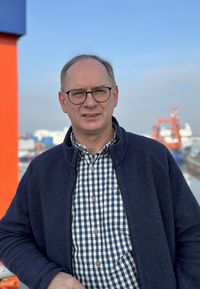Academic Counseling

Dr. Thomas Badewien
(Vertretung der Professur Marine Sensorik)
Interested
How nice that you are interested in the study programme marine sensors! We would like to convince you that there are many reasons for studying. Our students can certainly give you the most authentic answers. But our diverse course content and special study locations are also good reasons for studying. Read more about this below!
Why do You study marine sensors?
"I study marine sensors because I love expeditions with research ships. Moreover, I think that the interface between science and technology is exciting." Jana Dorothea Schmitz (start of studies summer semester 2018)
"I am studying marine sensors because I am fascinated by the complex processes in the sea. Besides, I want to develop a broad understanding of the application and evaluation of various marine measurement techniques and measurement methods." Claudia Thölen (start of studies summer semester 2018)
Study Contents
Study Locations
If we have been able to further strengthen your interest, we look forward to receiving your application! Information on the application process as well as our specialist flyer marine sensors can be found on our page Apply.

![[Translate to English:]](/f/5/_processed_/3/2/csm_ICBM-Logo-transparent-_91fe1c6774.png)